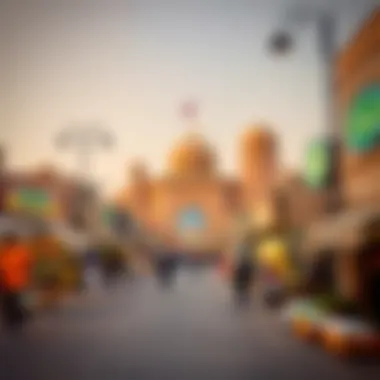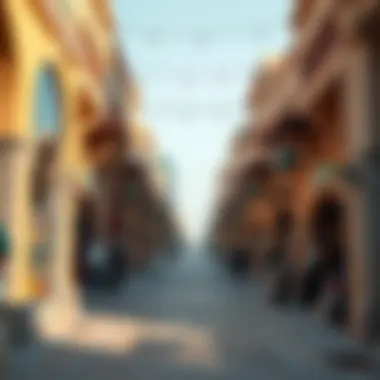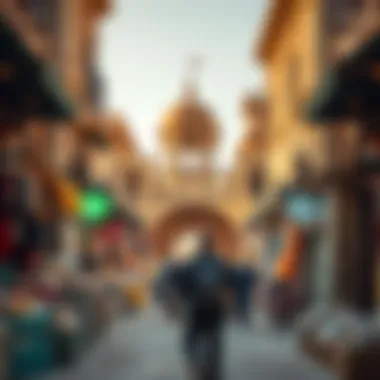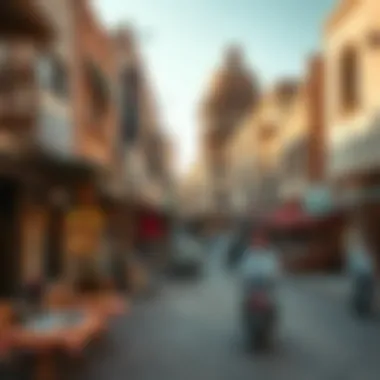Discovering Souq Al Sabkha: Dubai's Vibrant Marketplace


Intro
Nestled in the bustling heart of Dubai, Souq Al Sabkha isn't just a market; it's a living tapestry woven with threads of history, culture, and commerce. For anyone visiting the city or considering investment in its vibrant retail landscape, understanding this marketplace is essential. From its historic roots dating back decades to its contemporary importance, Souq Al Sabkha serves as a microcosm of the wider economic dynamics at play in Dubai.
Here, locals and tourists alike find an eclectic mix of products, from traditional artifacts to modern goods, creating an atmosphere that's buzzing with energy. This article will take you on a journey through the market's past and present, examining its significance not only as a shopping destination but as a pivotal point in Dubai's evolving identity. Whether you're a seasoned investor, a curious traveler, or someone simply wanting to understand the fabric of Dubai's marketplaces, Souq Al Sabkha offers valuable insights.
Throughout this comprehensive exploration, we will dive into its historical relevance, the unique products it offers, and the impact of this marketplace on the city's economy. By the end, readers will gain a nuanced understanding of what makes Souq Al Sabkha a cornerstone of Dubai's vibrant retail scene and why it remains an essential visit for anyone looking to experience the city's rich and diverse culture.
Intro to Souq Al Sabkha
Souq Al Sabkha is more than just a marketplace; it represents a historical and cultural tapestry woven into the very fabric of Dubai. This vibrant hub is a significant player in the economy, attracting visitors not only for shopping but also for the rich experiences it offers. Knowing more about Souq Al Sabkha is crucial for anyone wanting to understand not just where to find goods, but how the locale has evolved over the decades and what it symbolizes today.
Overview of Market
Souq Al Sabkha is renowned for its eclectic selection of goods, from traditional handicrafts to unconventional novelties. Shoppers can find everything from perfumes and spices to kitchenware and textiles. The arrangement of stalls invites exploration—each turn revealing a new product or vendor, creating an experience that's engaging and full of surprises. The buzz of bargaining is ever-present. Traders are often friendly, ready to chat as they offer their goods, creating a communal feel amidst the hustle and bustle.
More than the items available, it’s the atmosphere that makes Souq Al Sabkha special. The vibrant colors, alluring scents, and lively sounds contribute to what can only be described as an immersive shopping experience. It’s a space where one can truly sense the pulse of local life; a stroll through the narrow alleyways can be as educational as it is enjoyable.
Historical Background
The history of Souq Al Sabkha dates back to the early days of Dubai, acting as a trading post long before the city became the bustling metropolis it is today. Established around the 1970s, it served as a cornerstone of commerce, where local merchants and traders conducted business against the backdrop of a small fishing village that was slowly transforming.
As Dubai evolved from a modest trade center to a global city, Souq Al Sabkha’s role adapted but never diminished. The souq has stood the test of time, melding the past with the present. It retains its charm and significance, showcasing the rich heritage and customs of the region.
The market's resilience through economic shifts and modern developments is noteworthy. Even in the face of towering skyscrapers and sophisticated malls that dot Dubai’s skyline, Souq Al Sabkha remains an integral part of the city's soul. This juxtaposition between tradition and modernity makes it a fascinating place to visit, not just for buyers or investors but for anyone interested in the cultural narrative of Dubai.
"Visiting Souq Al Sabkha is like stepping back in time while still being firmly planted in the present — it showcases the beautiful dichotomy of Dubai's evolution."
In essence, the market serves as a bridge connecting generations of commerce, culture, and community. Understanding this market gives insights not just into what it sells, but into the very spirit of Dubai.
Cultural Significance of Souq Al Sabkha
Souq Al Sabkha is more than just a marketplace; it serves as a cultural epicenter in Dubai, reflecting the historical tapestry of the region while providing a venue for community interaction. This section will shed light on the intricate role this souq plays in local commerce and how it acts as a bridge for cultural exchange and interaction among diverse groups.
Role in Local Commerce
At the heart of Dubai’s vibrant trading culture, Souq Al Sabkha acts as a kaleidoscope of commerce, where providers and buyers converge under one roof. Various traders—ranging from seasoned merchants to enthusiastic small business owners—offer their goods in a landscape abundant with opportunity.
- Local Vendors: Many local vendors showcase unique offerings that encapsulate the essence of Emirati traditions. This includes spices, textiles, and handicrafts that can't be found in larger commercial outlets.
- Economic Impact: Souq Al Sabkha significantly contributes to the local economy. It provides employment opportunities not just for sellers but also for many service providers who assist in the daily operations of this buzzing locale. This interplay of supply and demand fosters economic resilience, benefiting the local communities.
- Networking Opportunities: The souq also serves as a meeting point for various business professionals, ranging from potential investors to local artisans. This allows for networking that can lead to fruitful partnerships and business ventures.
In a world where corporate giants dominate retail, Souq Al Sabkha stands as a testament to grassroots commerce and the vibrancy of local trade.
Cultural Exchange and Interaction
Souq Al Sabkha is a melting pot where cultures meet and mingle, making it a hub for cultural exchange. Visitors and locals alike engage in interactions that enrich their understanding of one another's traditions and lifestyles. Through trade, stories unfold that create connections across diverse backgrounds.
- Culinary Diversity: The market is a cornucopia of flavors, featuring local delicacies from various cultural backgrounds. Visitors can find everything from traditional Emirati cuisine to cuisines from South Asia, the Levant, and beyond, fostering an appreciation for culinary arts and practices.
- Art and Tradition: Artisans at Souq Al Sabkha often share their craft with passersby, demonstrating skills that have been handed down through generations. These interactions provide an educational experience for tourists and residents who wish to learn more about the rich tapestry of Dubai's cultural heritage.
- Community Events: Festivals and special events are frequently organized, where cultural performances and exhibitions take place. These occasions bring people together, promoting a sense of belonging and communal spirit among diverse groups.
In essence, the cultural significance of Souq Al Sabkha shines through its role in fostering local commerce and facilitating cultural exchange, making it much more than a simple marketplace. Far from just a place for transactions, it nurtures relationships, traditions, and a collective communal identity.
The Economic Landscape
The economic status of Souq Al Sabkha is a key aspect of its identity and relevance. Positioned as a historical marketplace within the vibrant hub of Dubai, the souq serves as a microcosm of the city’s broader economic environment. It embodies not only traditional trading practices but also reflects the ongoing transition to modern retail paradigms.
Market Dynamics
The market dynamics at Souq Al Sabkha are influenced by a plethora of factors, from seasonal fluctuations to the ever-changing tastes of consumers. The variety of goods showcases the local craftsmanship intertwined with practical merchandise, creating a unique shopping experience. Vendors often compete to attract customers by offering bespoke services, such as customization or free samples.
- Product Range: A mix of traditional items like spices, textiles, and hand-crafted goods alongside modern essentials.
- Consumer Behavior: The souq attracts both residents and tourists, leading to diverse shopping habits.
- Sales Strategies: Sellers frequently employ traditional sales techniques, like haggling, which immerses the shopper in a culturally rich experience.
Each of these factors fuels the competition among local traders and encourages innovation, ensuring an ever-evolving marketplace. The mix of tradition and modernity provides a compelling case for anyone looking to understand the pulse of Dubai’s retail landscape.


Impact on Local Economy
The impact of Souq Al Sabkha on the local economy is significant, extending beyond mere sales figures. It serves as a catalyst for job creation, offering vital employment opportunities to residents in the area. Many of the market’s vendors are local entrepreneurs, contributing to the economic vitality of the region. This is reflected in several notable benefits:
- Employment Generation: Direct jobs are provided within the souq, from stall owners to artisans.
- Economic Multipliers: The flow of money through the local economy creates further opportunities in related sectors, from hospitality to transportation.
- Cultural Retention: The souq plays an essential role in preserving traditional crafts and local heritage, ensuring that cultural identities are maintained while also generating income.
"Souq Al Sabkha serves not only as a shopping destination but as a vital economic engine for the community."
As tourist numbers continue to grow, the economic significance of this marketplace is expected to evolve. Investors and developers are keen to identify opportunities that arise from the ongoing changes, particularly in terms of infrastructure improvements and enhanced tourism strategies. The evolving economic landscape of Souq Al Sabkha represents a delicate balance between preserving its historical essence and embracing modernity.
Architectural Features of Souq Al Sabkha
The architectural features of Souq Al Sabkha play a fundamental role in conveying the essence and character of this notable marketplace. Not only do they reflect the rich history and cultural depth of Dubai, but they also serve practical functions that enhance the shopping experience for visitors and locals alike. Flanked by bustling streets and steeped in tradition, the design and layout of the Souq provide more than just aesthetic appeal. They foster an atmosphere that stimulates commerce while preserving the traditions of the past.
Design and Layout
At a glance, the design of Souq Al Sabkha reveals a versatile blend of traditional and contemporary architectural styles. The layout is typically labyrinthine, with winding passages that invite exploration. Vendors set up shop in vibrant stalls adorned with colorful fabrics and intricate handcrafts, calling to mind the historic souqs of the past while incorporating modern touches.
Some noteworthy design elements include:
- Open-air spaces: These areas allow natural light to flow in, making the environment feel more welcoming and less claustrophobic.
- Traditional wind towers: Integrated into some of the buildings, these structures serve as a nod to Islamic architecture, offering natural ventilation while providing a glimpse into the region's heritage.
- Distinctive arches and courtyards: Adding a touch of elegance, these architectural features create gathering spots for visitors, as well as spaces for informal negotiations and social interactions.
Many locals emphasize the importance of these design aspects, stating,"The souq isn’t just a place to shop; it’s where we come to connect and interact with each other.” This sentiment encapsulates the soul of the marketplace, highlighting how the design supports social harmony and encourages community engagement.
Significant Structures
Among the myriad of shops and stalls within Souq Al Sabkha, certain structures stand out due to their historical importance or unique offerings. One such landmark is the Trade Centre, which serves not just as a commercial hub but also as a cultural point of interest. This building's facade integrates traditional elements with modern materials, symbolizing the fusion of past and present.
Other significant features include:
- Heritage Exhibition Centre: This venue profiles the local history and crafts, showcasing traditional Emirati artisans at work.
- Art Galleries: Scattered throughout the souq, these spaces exhibit contemporary local art, adding to the creative dimension of the marketplace.
- Cafes and Eateries: Positioned strategically, they provide visitors a chance to sip Arabic coffee or enjoy local dishes, enhancing the sensory experience of the souq.
"When you step into Souq Al Sabkha, you’re stepping into a world where past and present dance together beautifully," a local vendor remarked.
The architectural landscape of Souq Al Sabkha not only enhances the shopping experience but also communicates the story of Dubai’s evolution, making it an essential element to consider for anyone interested in the area's cultural and economic dynamics.
Diverse Offerings at Souq Al Sabkha
The diversity at Souq Al Sabkha is what makes it a treasure trove for both locals and travelers alike. This marketplace isn’t just a place to shop; it’s a vivid canvas painted with the colors, fragrances, and textures of its products. The myriad of goods available reflect the culture and traditions of the region, drawing in people from all walks of life. In this section, we'll explore the different types of offerings and the unique traditional crafts that give Souq Al Sabkha its character.
Types of Goods Available
When you step into Souq Al Sabkha, the first thing that greets you is the tantalizing array of products on display. From spices that evoke the essence of the Middle East to intricate jewelry that captures the light in a mesmerizing dance, there's something for everyone. Here’s a breakdown of the highlights:
- Spices and Herbs: The air is thick with aromatic scents of saffron, cumin, and cardamom, inviting you to discover the culinary delights of Middle Eastern cuisine.
- Textiles: You’ll find beautiful fabrics including silk, cotton, and traditional Emirati attire that’s both vibrant and refined. The quality speaks volumes of the craftsmanship behind each piece.
- Jewelry: Gold and silver ornaments abound, some crafted with traditional motifs, while others lean towards contemporary designs. Whether you're seeking a statement piece or a humble souvenir, options are plentiful.
- Home Décor: Handcrafted items ranging from decorative lanterns to intricate pottery reflect the heritage of this historical marketplace.
The excitement of finding unique goods is what keeps buyers returning. People know they can discover treasures that are hard to locate in modern retail settings, giving Souq Al Sabkha a distinctive edge in the retail landscape of Dubai.
Traditional Crafts and Artifacts
In addition to the goods mentioned, the traditional crafts available in Souq Al Sabkha play an important role in preserving cultural heritage. Each item tells a story of its origins, often deeply rooted in local and regional traditions. Some notable types of crafts include:
- Handmade Carpets: The intricate patterns and vibrant colors of these carpets showcase the skills and creativity of local artisans. Each carpet is often a labor of love, taking weeks or even months to complete.
- Pottery: Locally made pots and figurines that are both functional and artistic capture the imagination of those who appreciate artisan craftsmanship.
- Falconry Equipment: Reflecting a cherished tradition in the region, items such as falcon hoods and jesses are crafted with precision, catering to the rich heritage of falconry in Emirati culture.
"Each item in Souq Al Sabkha is not just a product, but a piece of history, echoing the traditions and skills of generations past."
Shopping in this historic souq transcends mere transactional exchanges, evolving into a journey where you interact with the stories behind each crafted piece. For those in the know, the time spent at Souq Al Sabkha shopping isn’t just about acquiring goods; it’s about engaging with the culture, understanding the artistry, and appreciating the heritage that each item embodies.
The various offerings at Souq Al Sabkha create a delightful collage of culture and commerce, illustrating how the past marries the present in this remarkable market.
Shopping Experience


The shopping experience at Souq Al Sabkha stands as an intrinsic aspect, defining the very essence of this bustling marketplace. It goes beyond mere transactions; it embodies a blend of tradition and modernity, offering an engaging journey through the myriad offerings available. Visitors can expect to immerse themselves in a vibrant atmosphere, accompanied by the rich scents and sounds that fill the air. This exploration not only satisfies the senses, but also leaves lasting impressions that highlight the cultural tapestry of Dubai.
Navigating the Marketplace
Navigating through Souq Al Sabkha can be likened to wandering through a maze of delights. The layout is a fascinating amalgamation of narrow passageways and vibrant displays. Here are key elements to consider while navigating:
- Know what you seek: Having an idea of the goods you want can save time. Are you looking for traditional textiles? Or perhaps jewelry crafted by local artisans?
- Follow your senses: Engage with the atmosphere. Allow the sights and sounds to guide you. Bright colors and exotic aromas can often lead to hidden treasures.
- Be prepared to explore: The marketplace has a character of its own. Don't rush; take the time to meander through the stalls, greet vendors, and appreciate the craftsmanship on display. Each step reveals a story; absorb it.
The market is divided into specific sections, each showcasing distinct products—from spices, textiles, and souvenirs to high-quality traditional handicrafts. Being attentive to signs and the layout can help consumers navigate to their chosen goods efficiently while enjoying the journey.
Negotiation Practices
Bargaining is part and parcel of the shopping experience at Souq Al Sabkha. It infuses a sense of culture into each transaction and allows buyers to feel in control of their purchases. However, engaging in negotiation requires a certain finesse:
- Know the value: Before entering into negotiations, it’s crucial to have an understanding of the typical price range for the items you’re interested in. Doing a bit of homework ahead of time can provide an edge.
- Start low: When making an offer, it’s common practice to begin below your ideal price. This gives room for negotiation and reflects the cultural custom of haggling.
- Build rapport: Establishing a friendly rapport with vendors can be beneficial. A simple smile and a warm greeting might lead them to offer you a more favorable deal.
"The art of negotiation is akin to a dance; it requires grace, timing, and a touch of flair."
The Role of Souq Al Sabkha in Tourism
The role of Souq Al Sabkha in tourism is multi-faceted, acting as an essential element in the fabric of Dubai’s vibrant marketplace scene. This bustling souq not only draws tourists with its eclectic mix of goods but also serves as a cultural hub, showcasing the rich heritage of Dubai. What makes Souq Al Sabkha particularly appealing is its unique blend of traditional and contemporary experiences, which resonate with both tourists and locals alike. As a traveler steps into the market, they are greeted by the sights, sounds, and scents that define the charm of Dubai's history.
Attraction for Tourists
Souq Al Sabkha attracts a diverse array of visitors, each with unique interests and expectations. The market is a treasure trove for those seeking authentic Arabic products, from spices to traditional textiles. One cannot overlook the alluring charm of navigating through the narrow lanes, where every turn uncovers something new, be it a handcrafted piece or an exquisite artifact. The energy of the market provides a vivid experience, allowing tourists to immerse themselves in the local culture.
Some key attractions include:
- Authentic Goods: Tourists can find items that reflect Dubai's heritage, such as handmade carpets, intricate jewelry, and aromatic spices.
- Bargaining: Engaging in friendly negotiations is part of the shopping ritual here, adding a layer of interaction between vendors and shoppers.
- Local Cuisine: The souq also offers an opportunity to taste traditional dishes from nearby eateries, making it a sensory journey that goes beyond shopping.
Tourists often leave Souq Al Sabkha with more than just souvenirs; they carry memories of lively exchanges, cultural appreciation, and a deeper understanding of Dubai’s lifestyle.
Events and Festivals
Events and festivals held at Souq Al Sabkha contribute significantly to its allure as a tourist destination. Throughout the year, the market hosts various cultural celebrations that spotlight local traditions and crafts. These events are not only enjoyable to attendees but also serve to educate visitors about Emirati culture.
Some notable festivals include:
- Eid Celebrations: These festivals often feature special stalls, traditional performances, and food that can draw countless visitors.
- Craft Exhibits: Local artisans showcase their work during specific times, allowing tourists to witness the creation of traditional crafts first-hand.
- Cultural Nights: These are organized periodically, offering music, storytelling, and demonstrations that highlight the culture of Dubai.
"Souq Al Sabkha is a living museum of sorts, enveloping visitors in the rich tapestry of Emirati traditions and commerce."
By integrating such events, Souq Al Sabkha not only enhances the tourism experience but also fosters a sense of community among visitors and locals. It's not just a marketplace; it’s a celebration of life, culture, and connection.
Souq Al Sabkha and Digital Transformation
In today's fast-paced world, the winds of change often sweep through even the most traditional structures. Souq Al Sabkha, with its vibrant cultural tapestry, is no exception to this trend. Embracing digital transformation is not merely a matter of keeping pace with the modern marketplace; it serves as a critical bridge connecting the rich heritage of this souq with the possibilities of technology and innovation.
As consumers increasingly gravitate toward online platforms, the impact of e-commerce on Souq Al Sabkha has begun to take shape in significant ways. It is essential to examine how the infusion of digital elements transforms the shopping experience, enhances market visibility, and evolves consumer interactions.
Impact of E-commerce
The rise of e-commerce signifies more than just a change in how products are bought and sold. For Souq Al Sabkha, it represents a gateway that opens up to a broader audience beyond the local community. With online shopping options, local vendors can now reach potential customers worldwide, circumventing geographical limitations. This reach could offer a boost in sales, as well as create an opportunity for smaller businesses to compete against larger retailers.
Moreover, integrating e-commerce into the fabric of Souq Al Sabkha demands a reevaluation of inventory management, marketing strategies, and customer engagement approaches. Vendors can streamline operations by utilizing online payment platforms and promoting products through social media channels. The shift towards digital not only helps in sustaining economic viability but also facilitates a distinctive shopping experience that resonates with tech-savvy consumers.
Adaptations to Modern Retail Trends
The need for adaptability has never been more pronounced as modern retail trends continue to evolve. For Souq Al Sabkha, incorporating elements such as mobile payment systems, QR codes, and virtual reality showcases can enhance the shopping experience, making it both seamless and engaging. These adaptations help maintain the market's relevance while catering to a generation that values convenience and connectivity.
Additionally, the introduction of digital marketing plays a crucial role in attracting a diverse customer base. By effectively leveraging social media platforms or even utilizing influencer partnerships, vendors can raise awareness about their offerings. This approach not only promotes specific products but also enhances the cultural stories that are the heartbeat of Souq Al Sabkha.


It's worth noting the delicate balance that must be struck—the integration of modern retail methods should enhance, not overshadow, the traditional atmosphere that defines the souq. Keeping the cultural essence while elevating the operational aspects through technology will prove vital for its future sustenance.
�The embrace of digital transformation in Souq Al Sabkha could pave the way for its evolution into a hybrid marketplace, merging heritage with innovation.
Challenges Faced by Souq Al Sabkha
Understanding the challenges faced by Souq Al Sabkha is crucial in analyzing its ongoing relevance and future viability. This bustling marketplace, while steeped in tradition and culture, now finds itself navigating a global retail landscape that is rapidly evolving. Several vital elements need to be addressed, particularly economic pressures and competition from modern retail formats. All of these factors have a profound impact on the market's sustainability and the livelihoods of those who depend on it.
Economic Pressures
The economic environment in which Souq Al Sabkha operates is far from stable. This marketplace has been experiencing significant economic pressures, which are manifesting in several ways. Inflation, fluctuating currency values, and changing consumer spending habits all contribute to a demanding situation for local vendors.
One aspect that has heightened these pressures is the cost of goods. Many traders obtain their inventory from international suppliers, and any uptick in shipping fees or tariffs has a direct impact on retail prices. As a result, local products may be priced out of the market compared to those offered by larger retail chains, which benefit from bulk purchasing.
Moreover, the recent economic downturns worldwide have forced consumers to tighten their belts, leading to a decline in discretionary spending. Traditional marketplaces such as Souq Al Sabkha are often the first to feel the pinch in times of economic trouble. In fact, reports indicate that many vendors have noted a substantial drop in foot traffic, which is crucial for their sales.
"Navigating the economic pressures can feel like running against the wind for many traders at Souq Al Sabkha. The task is daunting, yet many still remain hopeful, finding ways to adapt and forge ahead.”
Competition from Modern Retail
In addition to economic challenges, Souq Al Sabkha is facing stiff competition from modern retail. Large shopping malls and international retailers offer both residents and tourists an alternative shopping experience that is often more convenient and appealing in terms of variety and pricing. The glitzy allure of these establishments can be hard to resist.
Despite its unique offerings, Souq Al Sabkha struggles to compete with the technological advancements and extensive marketing strategies employed by these modern retailers. For instance, many consumers prefer the ease and comfort of ordering online, foregoing traditional shopping altogether. Additionally, modern retail often capitalizes on effective loyalty programs and aggressive discounts, which internal vendors at Souq Al Sabkha cannot easily match.
Many vendors have started to realize that simply relying on foot traffic won't cut it anymore. Some have begun to utilize social media platforms, like Instagram or Facebook, to reach a wider audience. Others are exploring options to blend traditional selling with digital initiatives, which helps them stay afloat in this tough market. However, adapting to these changes is not without its challenges as many local vendors might not have the resources or know-how to effectively market themselves online.
In summary, while Souq Al Sabkha holds a unique place in the cultural fabric of Dubai, it is not immune to the myriad of challenges presented by economic pressures and fierce competition from modern retail. To maintain its relevance, adaptability will be key. As we look toward the future, one cannot help but wonder how this landmark will evolve to meet the needs of a changing marketplace.
Future Prospects for Souq Al Sabkha
As we look toward the future, the potential for Souq Al Sabkha is both compelling and complex. This market has long been a focal point of trade and cultural exchange in Dubai, and its pathway ahead will be shaped by a multitude of factors ranging from economic trends to shifting consumer behaviors. Understanding these prospects is crucial not just for local stakeholders but for investors and entrepreneurs seeking to tap into the unique opportunities this market offers.
Potential Developments
Several trends will likely influence the trajectory of Souq Al Sabkha. Firstly, the growing interest in experiential shopping could redefine the marketplace. Consumers nowadays crave more than just acquiring products; they want to immerse themselves in the culture and heritage that surrounds them. To meet this demand, Souq Al Sabkha might enhance its offerings by establishing interactive spaces, where artisans can showcase their craftsmanship live, thereby enriching visitor experience.
Additionally, the integration of technology stands as a pivotal area for growth. As e-commerce continues to flourish, the market may adopt hybrid models combining traditional on-ground shopping with online platforms. This could appeal particularly to younger demographics, allowing them to explore local products from the comfort of their homes. Scaling logistical frameworks to support these developments will be essential, ensuring seamless operations within the bustling marketplace.
- Investment in Infrastructure: Enhancing accessibility and comfort with improved facilities, such as more shaded areas and seating, can attract a larger crowd.
- Focus on Sustainability: Implementing green practices can solidify the market's role in promoting sustainable consumption patterns.
Sustaining Cultural Heritage
In a rapidly modernizing world, the importance of preserving the cultural fabric of Souq Al Sabkha cannot be overstated. This marketplace is not merely a venue for commerce—it is a living repository of traditions and craftsmanship that reflect the essence of Dubai's rich heritage. Initiatives aimed at sustaining cultural heritage shall play a key role in shaping the future of this marketplace.
One of the ways to achieve this is through educational programs that engage the local population and tourists alike. Workshops that teach traditional crafts—like weaving, pottery, or spice blending—would not only preserve these skills but also foster appreciation for the artisans behind them. Moreover, collaborations with universities and cultural institutions could facilitate research and documentation of these practices, elevating their visibility.
“To safeguard our heritage is to ensure our identity; Souq Al Sabkha embodies this spirit.”
Utilizing digital channels to showcase local stories and traditions is another avenue worth exploring. By sharing narratives about the artisans and their workshops online, Souq Al Sabkha can enhance its global footprint, engaging a broader audience while maintaining a connection to its roots.
Ending
The conclusion of this article stands as a testament to the intricate tapestry that Souq Al Sabkha weaves within the larger narrative of Dubai's commercial landscape. This marketplace is not merely a collection of stalls but embodies the confluence of history, culture, and economic vitality. As we reflect on the various dimensions of Souq Al Sabkha, several key elements emerge as particularly noteworthy.
Summary of Insights
In exploring the myriad facets of Souq Al Sabkha, it is essential to recognize its role as a cultural hub. The market provides a unique platform for cultural exchange, a melting pot where local traditions merge with contemporary influences. Furthermore, its importance to the local economy cannot be understated; it serves as a critical artery for commerce, supporting countless vendors and artisans.
Moreover, the research highlights the market's adaptability in the face of modern challenges, such as e-commerce and competition from large retail chains. These insights reiterate not only the resilience of Souq Al Sabkha but also its potential as a tourist attraction. As visitors flock to its vibrant atmosphere and diverse offerings, the marketplace stands to benefit significantly from both cultural tourism and economic engagement.
"Souq Al Sabkha is not just a market; it is a canvas painted with the strokes of history, trade, and cultural dialogues."
Final Thoughts
As we conclude this examination, the future of Souq Al Sabkha appears to be bright, contingent upon its ability to preserve its unique identity while embracing innovation. The strategies discussed in this article underscore the importance of sustaining cultural heritage in a rapidly changing world. Investors, buyers, and sellers would do well to harness the potential inherent in this market.
In a broader sense, Souq Al Sabkha epitomizes the essence of Dubai itself—dynamic, thriving, and steeped in a rich cultural narrative. For those navigating the retail landscape, whether as businesspeople or tourists, understanding Souq Al Sabkha is crucial for making informed decisions that support both personal and communal growth. The market’s lessons in adaptability and resilience serve as a guiding light for future endeavors.











